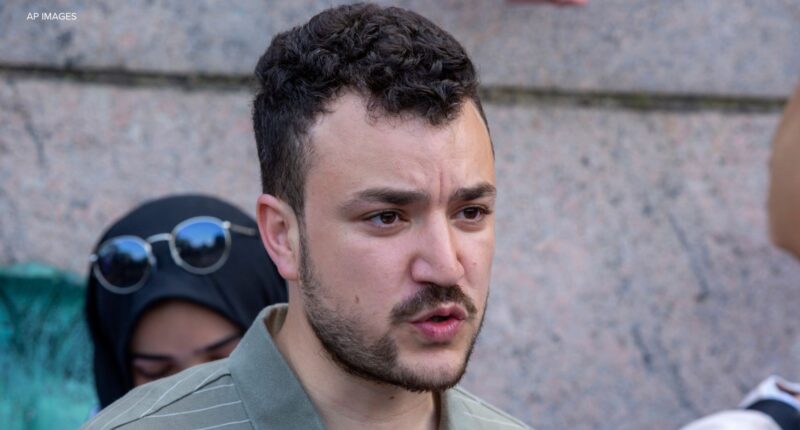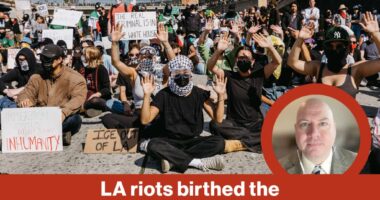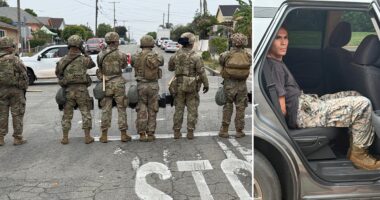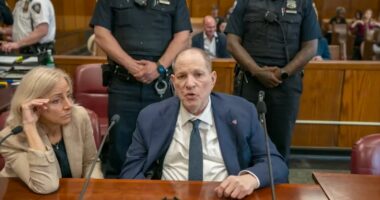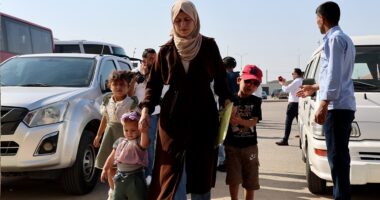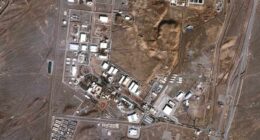Newark, New Jersey – A federal judge has ruled that Mahmoud Khalil, a former Columbia University graduate student targeted for deportation by the Trump administration due to his involvement in pro-Palestinian protests, must be released.
Khalil, who is a legal U.S. resident, will, however, remain in custody until at least Friday as the government has the opportunity to appeal, according to U.S. District Judge Michael Farbiarz’s statement on Wednesday.
Clear, a legal nonprofit and clinic at the City University of New York representing Khalil, expressed satisfaction with the court’s decision. Co-director Ramzi Kassem stated, “The court’s decision is the most significant vindication yet of Mahmoud’s rights. But we aren’t out of the woods until Mahmoud is free and back home with his wife and child.”
Lawyers and spokespersons for the Justice Department, which is handling the case, didn’t immediately respond to an email seeking comment.
Khalil was detained by federal immigration agents on March 8 in the lobby of his university-owned apartment, the first arrest under President Donald Trump’s crackdown on students who joined campus protests against the war in Gaza.
He was then flown across the country and taken to an immigration detention center in Jena, Louisiana, thousands of miles from his attorneys and wife, a U.S. citizen who gave birth to their first child while he was in custody.
Khalil’s lawyers challenged the legality of his detention, accusing the Trump administration of trying to suppress free speech. U.S. Secretary of State Marco Rubio says he has the power to deport Khalil because his presence in the U.S. could harm foreign policy.
Farbiarz had ruled earlier that expelling Khalil from the U.S. on those grounds was likely unconstitutional.
In his new ruling Wednesday, the judge said that Khalil had shown that his continued detention is causing irreparable harm to his career, his family and his free speech rights.
However, the judge put his order on hold until 9:30 a.m. Friday to allow the government time to appeal. He also required Khalil to post a $1 bond before he is freed.
In his ruling, Farbiarz cited Khalil’s statement to the court last week that the revocation of his green card has damaged his career prospects, including a decision by Oxfam International to rescind a job offer to serve as a policy adviser. The judge also noted that the decision deterred Khalil from engaging in constitutionally protected protests and free speech-related activities.
“The Court finds as a matter of fact that the Petitioner’s career and reputation are being damaged and his speech is being chilled – and this adds up to irreparable harm,” the judge wrote.
Farbiarz noted in his ruling that the government has also argued it is detaining and deporting Khalil in part because of alleged omissions on his green card application.
But the judge said evidence presented by his attorneys showed lawful permanent residents are virtually never detained for such a thing.
Khalil, in his statement to the court last week, also disputed that he wasn’t forthcoming on the application.
For example, he said he was never employed by or served as an “officer” of the United Nations Relief and Works Agency for Palestine Refugees, as the administration claims, but completed an internship approved by the university as part of his graduate studies.
The judge’s decision comes after several other legal residents targeted for their activism have been released from custody, including another Palestinian student at Columbia, Mohsen Mahdawi; a Tufts University student, Rumeysa Ozturk; and a Georgetown University scholar, Badar Khan Suri.
Rubio has cited a rarely used statute to justify the deportation of Khalil and others, which gives him power to deport those who pose “potentially serious adverse foreign policy consequences for the United States.”
Khalil isn’t accused of breaking any laws during the protests at Columbia. The government, however, has said that noncitizens who participate in such demonstrations should be expelled from the country for expressing views that the administration considers to be antisemitic and “pro-Hamas,” referring to the Palestinian militant group that attacked Israel on Oct. 7, 2023.
Khalil, then an international affairs graduate student, had served as a negotiator and spokesperson for student activists at Columbia who took over a campus lawn last spring to protest Israel’s military campaign in Gaza.
The university brought police in to dismantle the encampment after a small group of protesters seized an administration building. Khalil is not accused of participating in the building occupation and wasn’t among the people arrested in connection with the demonstrations.
But images of his maskless face at protests, along with his willingness to share his name with reporters, made him an object of scorn among those who saw the protesters and their demands as antisemitic. The White House accused Khalil of “siding with terrorists,” but has yet to give any evidence for the claim.
Copyright © 2025 by The Associated Press. All Rights Reserved.
